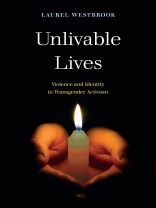Anti-violence movements rooted in identity politics are commonplace, including those to stop violence against people of color, women, and LGBT people.
Unlivable Lives reveals the unintended consequences of this approach within the transgender rights movement in the United States. It illustrates how this form of activism obscures the causes of and lasting solutions to violence and exacerbates fear among members of the identity group, running counter to the goal of making lives more livable. Analyzing over a thousand documents produced by thirteen national organizations, Westbrook charts both a history of the movement and a path forward that relies less on identity-based tactics and more on intersectionality and coalition building. Provocative and galvanizing, this book envisions new strategies for anti-violence and social justice movements and will revolutionize the way we think about this form of activism.
Cuprins
List of Illustrations
Preface
Acknowledgments
Abbreviations
1. Unlivable Lives: The Origins and Outcomes of Identity-Based Anti-Violence Activism
2. Violence Matters: Producing Identity through Accounts of Murder
3. Atypical Archetypes: The Causes and Consequences of Famous Victims of Violence
4. Homogeneous Subjecthood: How Activists’ Focus on Identity Obscures Patterns of Violence
5. Valuable and Vulnerable: How Activists’ Tactical Repertoires Shape Subjecthood and Generate Fear
6. Shaping Solutions: How Identity Politics Influences Violence-Prevention Efforts
7. Facilitating Livable Lives: Alternative Approaches to Anti-Violence Activism
Appendix A: Transgender Anti-Violence Organizations
Appendix B: Collecting Data on Murders of Transgender People
Notes
References
Index
Despre autor
Laurel Westbrook is Associate Professor of Sociology at Grand Valley State University and cofounder of Sociologists for Trans Justice.












